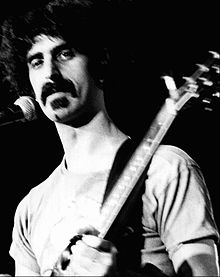Zappa also performed in 1991 in Prague, claiming that "was the first time that he had a reason to play his guitar in 3 years", and that that moment was just "the beginning of a new country", and asked the public to "try to keep your country unique, do not change it into something else".
In September 1992, the concerts went ahead as scheduled but Zappa could only appear at two in Frankfurt due to illness. At the first concert, he conducted the opening "Overture", and the final "G-Spot Tornado" as well as the theatrical "Food Gathering in Post-Industrial America, 1992" and "Welcome to the United States" (the remainder of the program was conducted by the ensemble's regular conductor Peter Rundel). Zappa received a 20-minute ovation. G-Spot Tornado was performed with Canadian dancer Louise Lecavalier. It was his last professional public appearance as the cancer was spreading to such an extent that he was in too much pain to enjoy an event that he otherwise found "exhilarating". Recordings from the concerts appeared on The Yellow Shark (1993), Zappa's last release during his lifetime, and some material from studio rehearsals appeared on the posthumous Everything Is Healing Nicely (1999).
Death
Zappa died from prostate cancer on December 4, 1993, 17 days before his 53rd birthday at his home with his wife and children by his side. At a private ceremony the following day, his body was buried in a grave at the Westwood Village Memorial Park Cemetery, in Los Angeles. The grave is unmarked. On December 6, his family publicly announced that "Composer Frank Zappa left for his final tour just before 6:00 pm on Saturday".
Musical style and development
Genres
The general phases of Zappa's music have been variously categorized under experimental rock, jazz, classical, avant-pop, experimental pop, comedy rock, doo-wop, jazz fusion, progressive rock, proto-prog, avant-jazz, and psychedelic rock.

Niciun comentariu:
Trimiteți un comentariu